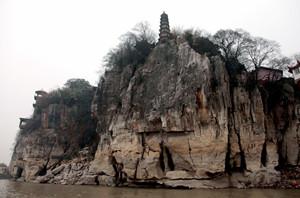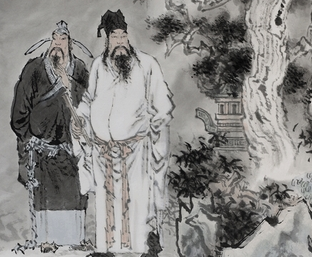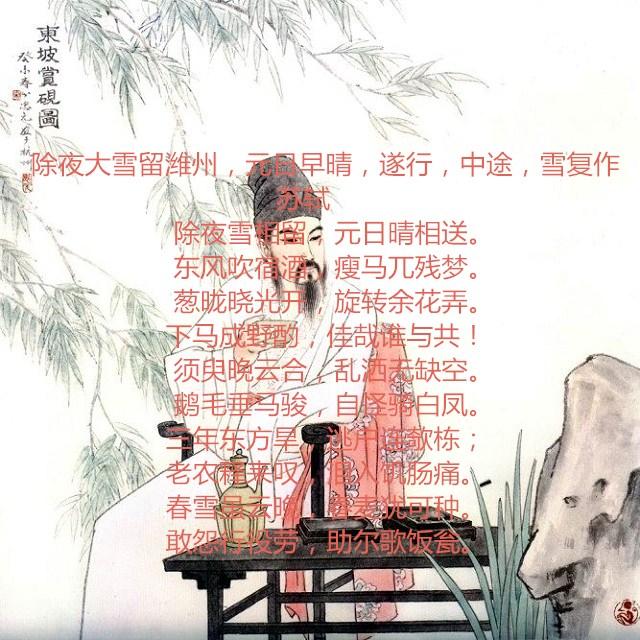|
|

导读:《石钟山记》是北宋著名文学家苏轼的作品。这篇文章通过记叙作者对石钟山得名由来的探究,说明要认识事物的真相必须“目见耳闻”,切忌主观臆断的道理。
苏轼《石钟山记》
《水经》云:“彭蠡之口有石钟山焉。”郦元以为下临深潭,微风鼓浪,水石相搏,声如洪钟。是说也,人常疑之。今以钟磬置水中,虽大风浪不能鸣也,而况石乎!至唐李渤始访其遗踪,得双石于潭上,扣而聆之,南声函胡,北音清越,枹止响腾,余韵徐歇。自以为得之矣。然是说也,余尤疑之。石之铿然有声者,所在皆是也,而此独以钟名,何哉?
元丰七年六月丁丑,余自齐安舟行适临汝,而长子迈将赴饶之德兴尉,送之至湖口,因得观所谓石钟者。寺僧使小童持斧,于乱石间择其一二扣之。硿硿焉,余固笑而不信也。至莫夜月明,独与迈乘小舟,至绝壁下。大石侧立千尺,如猛兽奇鬼,森然欲捕人;而山上栖鹘,闻人声亦惊起,磔磔云霄间;又有若老人咳且笑于山谷中者,或曰此鹳鹤也。余方心动欲还,而大声发于水上,噌吰如钟鼓不绝。舟人大恐。徐而察之,则山下皆石穴罅,不知其浅深,微波入焉,涵淡澎湃而为此也。舟回至两山间,将入港口,有大石当中流,可坐百人,空中而多窍,与风水相吞吐,有窾坎镗鞳之声,与向之噌吰者相应,如乐作焉。因笑谓迈曰:“汝识之乎?噌吰者,周景王之无射也;窾坎镗鞳者,魏庄子之歌钟也。古之人不余欺也!”
事不目见耳闻,而臆断其有无,可乎?郦元之所见闻,殆与余同,而言之不详;士大夫终不肯以小舟夜泊绝壁之下,故莫能知;而渔工水师虽知而不能言,此世所以不传也。而陋者乃以斧斤考击而求之,自以为得其实。余是以记之,盖叹郦元之简,而笑李渤之陋也。
The Stone Bell Mountain
Su Shi
The Classic of Water says: "At the mouth of Pengli stands the Stone Bell Mountain." Its commentator Li Daoyuan(died A.D. 527) states that "there is a deep water at its foot, where the winds and waves striking the rocks make a sound like that of great bells."
People often discredit this statement, for bells and musical stones submerged in waves do not make such a sound, not to speak of rocks. Not until the Tang Period did Li Bo visit the place, where he found two rocks from the water. When struck with a wooden handle, they made a clanging sound, dying away gradually like bells, one in a clearer and the other in a muffled tone. He thought he had thus verified the origin of the name. But I had my doubts, for there are certainly rocks which make a ringing sound when struck, but these were said to make sounds like bells.
In June 1084, I was making a voyage from Qi'an to Linru, and my eldest son, and thus we had no opportunity to visit it and see the stone bells. A monk sent a boy to show us. The boy took an ax and struck at some of the rocks near by at random, but there was nothing unusual about the dull thuds. I gave up for hearsay and laughed.
That night, however, there was a bright moon, and I took a boat with Mai to the foot of the mountain. The river here was flanked by a high cliff almost a thousand feet high. As seen in the moonlight, the rocks looked very much like some weird monsters or dark spirits in frightening postures. The hawks nesting above flew up with raucous cries upon hearing our approach. There was another noise like an old man coughing chortling somewhere in the air. We were told that this came from a species of cranes. I was quite moved and was thinking of turning back when a great noise came over the waters, booming and whining like drums and bells, which quite frightened the boatman.
Upon close examination, I found that at the foot of the cliff were a number of stone caves of unknown depth. When the waves hit the caves, it made that roaring, surging noise. On turning back past Hanshan, at the point where the lake waters joined the big river, there was a huge rock in the middle of the stream, big enough to hold a hundred people. This huge boulder was full of holes and hollows, and the winds and waters sucking through them swish-swashed and make a booming noise, which joined with the clanging from the water caves to make such a symphony.
I said to my son: "Mai, you see. That clanging from the caves will help you to understand the mention in history book of the sound of the bells of the Emperor Jing of Zhou Dynasty, and the boom will help you to appreciate the description of the orchestra bells of Wei Zhuangzi. Evidently, what the ancient books tell us is true."
One is often inclined to doubt ancient records until one personally sees these things. Li Daoyuan must have seen what we have seen, but he was not very explicit. The scholars usually would not take the trouble to take a boat to the foot of the cliff, so they could not have known. The boatmen know about it, of course, but they do not record it in books. Li Bo verified it only superficially by knocking at a couple of rocks on land, and he never really found out where the sounds came from.
I write this down, to show that Li Daoyuan did not say enough and Li Bo did not know enough.
苏轼-《记承天寺夜游》英译
《记承天寺夜游》是北宋著名文学家苏轼创作的一篇散文,写于宋神宗元丰六年(1083年),当时,作者正因“乌台诗案”被贬谪到黄州任职。对月夜景色作了美妙描绘,真实的记录了作者当时生活的一个片段。文章表达苏轼壮志难酬的苦闷,自解、自慰、自我排遣,同时表现苏轼的旷达乐观的人生态度。

《记承天寺夜游》 苏轼
元丰六年十月十二日,夜。解衣欲睡。月色入户,欣然起行。念无与为乐者,遂至承天寺,寻张怀民。怀民亦未寝,相与步于中庭。庭下如积水空明,水中藻荇交横,盖竹柏影也。何夜无月,何处无竹柏,但少闲人如吾两人者耳。黄州团练副使苏某书。
Record of a Nightout at Cheng Tian Temple
Sushi
On the night of 12th 10th month in the 6th year of the Yuanfeng reign, I took off my clothes to sleep. As moonlight showered into the room, I got up at its invitation and ventured out. For someone to share the fun, I proceeded to Cheng Tian Temple to look for Zhang Huaimin. Huaimin, too, has yet to retire for the night, and together we went to the center courtyard. Down there, the yard glittered bright as if from pools of water crisscrossed with aquatic plants, which turned out to be shadows of bamboos and cypresses. Is there ever a night without a moon, or any place without bamboos and cypresses? But there is definitely a dearth of idlers like us two. Written by a certain Deputy Officer Su of the Village Militia of Huangzhou.
苏轼·《念奴娇·赤壁怀古》英译
导读:《念奴娇·赤壁怀古》是北宋著名词人苏轼的作品,是豪放词的代表作之一。此词通过对月夜江上壮美景色的描绘,借对古代战场的凭吊和对风流人物才略、气度、功业的追念,曲折地表达了作者怀才不遇、功业未就、老大未成的忧愤之情,同时表现了作者关注历史和人生的旷达之心。全词借古抒怀,雄浑苍凉,大气磅礴,笔力遒劲,境界宏阔,将写景、咏史、抒情融为一体,给人以撼魂荡魄的艺术力量,曾被誉为“古今绝唱”。
苏轼 《念奴娇·赤壁怀古》
大江东去,浪淘尽,千古风流人物。
故垒西边,人道是、三国周郎赤壁。
乱石穿空,惊涛拍岸,卷起千堆雪。
江山如画,一时多少豪杰!
遥想公瑾当年,小乔初嫁了,雄姿英发。
羽扇纶巾,谈笑间、樯橹灰飞烟灭。
故国神游,多情应笑我,早生华发。
人生如梦,一尊还酹江月。
Tune:"The Charms of Niannu"
Su Shi
The waves of the mighty river flowing eastward
Have swept away the brilliant figures of a thousand generations.
West of the old fortress,
So people say, is Lord Zhou's Red Cliff in the time of the Three Kingdoms.
The tumbling rocks thrust into the air;
The roaring surges dash upon the shore,
Rolling into a thousand drifts of snow.
The River and the mountains make a vivid picture—
What a host of heroes once were!
And I recall the young Lord then,
Newly married to the fair younger Qiao,
His valorous features shown forth;
With a feather fan and a silken cap
Amid talking and laughing he put his enemy's ships to ashes and smoke.
While my thoughts wander in the country of old,
Romantic persons might smile at my early grey hair.
Ah, life is but like a dream;
With a cup of wine, let me yet pour a libation to the moon on the river.
东风袅袅泛崇光,香雾空蒙月转廊。
只恐夜深花睡去,故烧高烛照红妆。
The flower in east wind exhales a tender light
And spreads a fragrant mist when the moon turns away.
I am afraid she'd fall asleep at dead of night;
A candle's lit to make her look fair as by day.引自 《苏轼诗词》:Poems of Su Shi;
竹外桃花三两枝,春江水暖鸭先知。
蒌蒿满地芦芽短,正是河豚欲上时。
Beyond bamboos a few twigs of peach blossoms blow;
When spring has warmed the stream, ducks are the first to know.
By water side short reeds bud and wild flowers teem;
It is just time for the globefish to swim upstream.引自 《苏轼诗词》:Poems of Su Shi;
十年生死两茫茫,不思量,自难忘。千里孤坟,无处话凄凉。纵使相逢应不识,尘满面,鬓如霜。
夜来幽梦忽还乡。小轩窗,正梳妆。相顾无言,惟有泪千行。料得年年肠断处,明月夜,短松岗。
For ten long years the living of the dead knows nought.
Though to my mind not brought,
Could the dead be forgot?
Her lonely grave is far, a thousand miles away.
To whom can I my grief convey?
Revived, e'en if she be, oh could she still know me?
My face is worn with care
And frosted is my hair.
Last night I dreamed of coming to our native place;
She's making up her face
Before her mirror with grace.
Each saw the other hushed,
But from our eyes tears gushed.
When I am woken, oh, I know I'll be heart-broken
Each night when the moon shines
O'er her grave clad with pines. 引自 《苏轼诗词》:Poems of Su Shi;
明月几时有?把酒问青天。不知天上宫阙,今夕是何年。我欲乘风归去,又恐琼楼玉宇,高处不胜寒。起舞弄清影,何似在人间?
转朱阁,低绮户,照无眠。不应有恨,何事长向别时圆?人有悲欢离合,月有阴晴圆缺,此事古难全。但愿人长久,千里共婵娟。
How long will the full moon appear?
Wine cup in hand, I ask the sky.
I do not know what time of year
'Tould be tonight in the palace on high.
Riding the wind, there I would fly,
Yet I'm afraid the crystalline palace would be
Too high and too cold for me.
I rise and dance, with my shadow I play.
On high as on earth, would it be as gay?
The moon goes round the mansions red
Through gauze-draped windows soft to shed
Her light upon the sleepless bed.
Against man she should have no spite.
Why then when people part, is she oft full and bright?
Men have sorrow and joy; they part or meet again;
The moon is bright or dim and she may wax or wane.
There has been nothing perfect since the olden days.
So let us wish that man
Will live long as he can!
Though miles apart, we'll share the beauty she displays.引自 《苏轼诗词》:Poems of Su Shi;
暮云收尽溢清寒,银汉无声转玉盘。
此生此夜不长好,明月明年何处看?
Clouds withdrawn, pure cold air floods the sky;
The River of Stars mute, a jade plate turns on high.
How oft can we enjoy a fine mid-autumn night?
Where shall we view next year a silver moon so bright?引自 《苏轼诗词》:Poems of Su Shi;
明月如霜,好风如许,清景无限。曲港跳鱼,圆荷泻露,寂寞无人见。紞如三鼓,铿然一叶,黯黯梦云惊断。夜茫茫,重寻无处,觉来小园行遍。
天涯倦客,山中归路,望断故园心眼。燕子楼空,佳人何在?空锁楼中燕。古今如梦,何曾梦觉?但有旧欢新怨。异时对,黄楼夜景,为余浩叹。
The bright moonlight is like frost white;
The breeze is cool like waves serene;
Far and wide extends the night scene.
In the haven fish leap
And dewdrops roll down lotus leaves
In solitude no man perceives.
Drums beat thrice in the night so deep,
E'en a leaf falls with sounds so loud
That, gloomy, I awake from my dream of the cloud.
Under the boundless pall of night,
Nowhere again can she be found,
Although I've searched o'er the garden's ground.
A tired wanderer far from home.
Vainly through mountains and hills my roam;
His native land from view is blocked.
The Pavilion of Swallows is empty, Where
Is the lady Pan-pan so fair?
In the pavilion only swallows' next is locked.
Both the past and the present are like dreams
From which we have ne'er been awake, it seems;
There's left but pleasure old or sorrow new.
Some future day will others come to view
The Yellow Tower's night scenery;
Would they then sigh for me!引自 《苏轼诗词》:Poems of Su Shi;
世事一场大梦,人生几度秋凉。夜来风叶已鸣廊,看取眉头鬓上。
酒贱常愁客少,月明多被云妨。中秋谁与共孤光?把盏凄然北望。
Like dreams pass world affairs untold,
How many autumns in our life are cold?
My corridor is loud with wind-blown leaves at night.
See my brows frown and hair turn white.
Of my poor wine few guests are proud;
The bright moon is oft veiled in cloud.
Who would enjoy with me the mid-autumn moon lonely?
Wine cup in hand, northward I look only.引自 《苏轼诗词》:Poems of Su Shi;
莫听穿林打叶声,何妨吟啸且徐行。竹杖芒鞋轻胜马,谁怕!一蓑烟雨任平生。
料峭春风吹酒醒,微冷。山头斜照却相迎。回首向来萧瑟处。归去!也无风雨也无晴。
Listen not to the rain beating against the trees.
Why don't you slowly walk and chant at ease?
Better than saddled horse I like scandals and cane.
Oh, I would fain
Spend a straw-cloaked life in mist and rain.
Drunken, I'm sobered by vernal wind shrill
And rather chill.
In front I see the slanting sun atop the hill;
Turning my head, I find the dreary beaten track.
Let me go back!
Impervious to wind, rain or shine, I'll have my will.引自 《苏轼诗词》:Poems of Su Shi;
可惜一溪风月,莫教踏碎琼瑶。解鞍欹枕绿杨桥,杜宇一声春晓。
My horse's hoofs may break, I'm afraid,
The breeze-rippled brook paved by moonlight's white jade.
I tie my horse to a bough of green willow
Near the bridge, then I pillow
My head on arms and sleep till the cuckoo's songs awake
A spring daybreak.引自 《苏轼诗词》:Poems of Su Shi;
念奴娇 赤壁
The endless river eastward flows;
With its huge waves are gone all those
Gallant heroes of bygone years.
West of the ancient fortress appears
Red Cliffs where General Zhou Yu won his early fame
When the Three Kingdoms were in flame.
Jugged rocks tower in the air
And washing waves beat on the shore,
Rolling up a thousand heaps of snow.
To match the hills and the river so fair,
How many heroes brave of yore
Made a great show!
I fancy General Zhou Yu at the height
Of his success, with a plume fan in hand,
In a silk hood, so brave and bright,
Laughing and jesting with his bride so fair,
While enemy ships were destroyed as planned
Like castles in the air.
Should their souls revisit this land,
Sentimental, his bride would laugh to say:
Younger than they, I have my hair turned grey.
Life is like a passing dream.
O Moon, I drink to you who saw them on the stream.引自 《苏轼诗词》:Poems of Su Shi;
夜饮东坡醒复醉,归来仿佛三更。家童鼻息已雷鸣。敲门都不应,倚杖听江声。
长恨此身非我有,何时忘却营营?夜阑风静縠纹平。小舟从此逝,江海寄余生。
Drinking at Eastern Slope by night,
I sober, then get drunk again.
When I come back, it's near midnight.
I hear the thunder of my houseboy's snore;
I knock, but no one answers at my door.
What can I do but, leaning on my cane,
Listen to the river's refrain?
I long regret I am not master of my own.
When can I just ignore the hums of up and down?
In the still night the soft winds quiver
On ripples of the river.
From now on I would vanish with my little boat;
For the rest of my life on the sea I would float.引自 《苏轼诗词》:Poems of Su Shi;
似花还似非花,也无人惜从教坠。抛家路旁,思量却是、无情有思。萦损柔肠,困酣娇眼,欲开还闭。梦随风万里,寻郎去处,又还被,莺呼起。
不恨此花飞尽。恨西园、落红难缀。晓来雨过,遗踪何在,一池萍碎。春色三分,二分尘土,一分流水。细看来,不是杨花,点点是离人泪。
They seem to be but are not flowers;
None pity them when they fall down in showers.
Forsaking leafy home,
By the roadside they roam.
I think they're fickle, but they've sorrow deep.
Their grief-o'erladen bowels tender
Like willow branches slender;
Their leaves like wistful eyes near shut with sleep,
About to open, yet soon closed again.
They dream of drifting with the wind for long,
Long miles to find their men,
But are aroused by orioles'song.
Grieve not for willow catkins flown away,
But that in western garden fallen petals red
Can't be restored. When dawns the day
And rain is o'er, we cannot find their traces
But in a pond with duckweeds overspread.
Of Spring's three graces,
Two have gone with the roadside dust
And one with waves. But if you just
Take a close look, then you will never
Find willow down but tears of those who sever,
Which drop by drop
Fall without stop.引自 《苏轼诗词》:Poems of Su Shi;
缺月挂疏桐,漏断人初静。谁见幽人独往来?缥缈孤鸿影。
惊起却回头,有恨无人省。拣尽寒枝不肯栖,寂寞沙洲冷。
From a sparse plane tree hangs the waning moon;
The water clock is still and hushed is man.
Who sees a hermit pacing up and down alone?
Is it the shadow of a swan?
Startled, he turns his head,
With a grief none behold.
Looking all over, he won't perch on branches dead
But on the lonely sandbank cold.引自 《苏轼诗词》:Poems of Su Shi;
花褪残红青杏小,燕子飞时,绿水人家绕。枝上柳绵吹又少,天涯何处无芳草!
墙里秋千墙外道,墙外行人,墙里佳人笑。笑渐不闻声渐悄,多情却被无情恼。
Red flowers fade, green apricots appear still small
When swallows pass
Over blue water that surrounds the garden wall.
Most willow catkins have been blown away, alas!
But there is no place where grows not the sweet green grass.
Without the wall there is a road, within a swing.
A passer-by
Hears a fair maiden's laughter in the garden ring.
The ringing laughter fades to silence by and by,
For the enchantress the enchanted can only sigh.
引自 《苏轼诗词》:Poems of Su Shi;
玉骨哪愁瘴雾?冰姿自有仙风。海仙时遣探芳丛,倒挂绿毛幺凤。
素面常嫌粉涴,洗妆不褪唇红。高情已逐晓云空,不与梨花同梦。
Your bones of jade defy miasmal death;
Your flesh of snow exhales immortal breath.
The sea sprite among flowers often sends to you
A golden-eyed, green-feathered cockatoo.
Powder would spoil your face;
Your lips need no rough cream.
As high as morning cloud you rise with grace;
With pear flowers you won't share your dream.引自 《苏轼诗词》:Poems of Su Shi;
去年相送,余杭门外,飞雪似杨花。今年春尽,杨花似雪,犹不见还家。
对酒卷帘邀明月,风露透窗纱。恰似姮娥怜双燕,分明照、画梁斜。
Last year we bade adieu
Outside the town;
Snow flew like willow down.
This year spring dies;
Like snow willow down flies.
But I can't come back to see you.
The screen uprolled, to wine I invite the moon bright;
Through the window the breeze brings in dew.
The Moon Goddess seems to care
For the swallows in pair.
She sheds her light
In to their dream on painted beam.引自 《苏轼诗词》:Poems of Su Shi;
回首乱山横,不见居人只见城。谁似临平山上塔,亭亭,迎客西来送客行。
归路晚风清,一枕初寒梦不成。今夜残灯斜照处,荧荧,秋雨晴时泪不晴。
Turning my head, I find rugged mountains bar the sky,
I can no longer see you in the town.
Who can be like the hilltop tower looking down,
So high?
It welcomed you from the west and bids you goodbye.
I come back at dusk in a gentle breeze.
On chilly pillow how can I dream with ease?
Where will the flickering lamp shed its lonely light
Tonight?
When autumn rain no longer falls drop by drop,
Oh, will tears stop?引自 《苏轼诗词》:Poems of Su Shi;
苏轼-《江城子·密州出猎》英译
导读:《江城子·密州出猎》是宋代文学家苏轼于密州知州任上所作的一首词。此词表达了强国抗敌的政治主张,抒写了渴望报效朝廷的壮志豪情。首三句直出会猎题意,次写围猎时的装束和盛况,然后转写自己的感想:决心亲自射杀猛虎,答谢全城军民的深情厚意。下片叙述猎后的开怀畅饮,并以魏尚自比,希望能够承担卫国守边的重任。
《江城子·密州出猎》 苏轼
老夫聊发少年狂,左牵黄,右擎苍。
锦帽貂裘,千骑卷平冈。
为报倾城随太守,亲射虎,看孙郎。
酒酣胸胆尚开张,鬓微霜,又何妨。
持节云中,何日遣冯唐?
会挽雕弓如满月,西北望,射天狼。
A Riverside Town
Su Shi
Rejuvenated, I my fiery zeal display;
Of left hand leash, a yellow hound,
On right hand wrist, a falcon grey.
A thousand silk-capped, sable-coated horsemen sweep
Across the rising ground
And hillocks steep.
Townspeople pour out of the city gate
To watch the tiger-hunting magistrate.
Heart gladdened with strong wine, who cares
About a few new-frosted hairs?
When will the court imperial send
An envoy to recall the exile? Then I'll bend
My bow like a full moon, and aiming northwest, I
Will shoot down the fierce Wolf from the sky.
苏轼-《除夜大雪留潍州元日早晴遂行中途雪复作》英译
《除夜大雪留潍州元日早晴遂行中途雪复作》是宋代文学家苏轼的诗作之一。此诗作于熙宁十年(1077)元日,时苏轼奉诏离密州移知河中府赴任途中。潍州即今山东潍坊市,在密州西北约七十公里。年节时分,大雪纷飞,东坡在旅途中。他没有抱怨行役的艰辛,倒更多地希望瑞雪预兆着丰年,使连年遭受蝗旱灾害的农民得到安乐。

《除夜大雪留潍州,元日早晴,遂行,中途,雪复作》 苏轼
除夜雪相留,元日晴相送。
东风吹宿酒,瘦马兀残梦。
葱昽晓光开,旋转余花弄。
下马成野酌,佳哉谁与共!
须臾晚云合,乱洒无缺空。
鹅毛垂马骏,自怪骑白凤。
三年东方旱,逃户连欹栋;
老农释耒叹,泪入饥肠痛。
春雪虽云晚,春麦犹可种。
敢怨行役劳,助尔歌饭瓮。
Caught in Snow
Su Shi
Heavy snow on New Year’s Eve kept me at Weizhou. New Year’s Day dawned clear and I resumed my journey, only to run into snow again.
Snow detained me on New Year’s Eve,
Clear skies speed me on my way on New Year’s Day;
The east wind scatters the fumes of last night’s wine
As I jog along on my lean nag, half dreaming still
In the brilliant morning sunlight,
While a few last snowflakes whirl.
I dismount to drink in the open,
Lacking nothing now but someone to share my wine;
But at dusk clouds gather fast,
The whole air is thick with snow,
Flakes cling like goose feathers to my horse’s mane,
And I marvel to find myself riding a white phoenix.
Three years of drought in the east
Emptied cottage after cottage, whole households fled;
Old peasants cast aside their ploughs and sighed,
Swallowing tears which stung their famished guts.
The snow is late this spring,
But it is not too late to snow spring wheat;
Why complain, then, of the hardships of the journey?
Rather let me sing of your good harvest to come. |
|